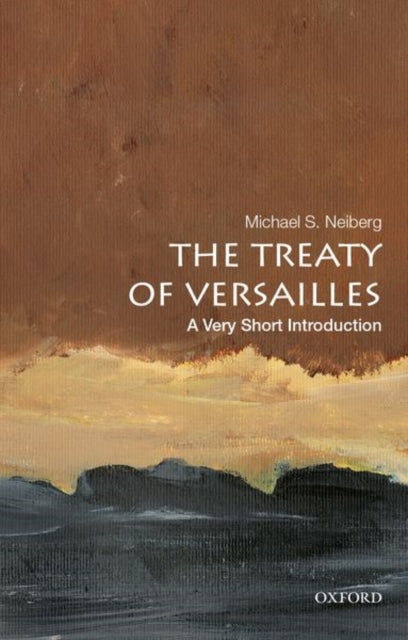Michael S.Neiberg
Treaty of Versailles: A Very Short Introduction
Treaty of Versailles: A Very Short Introduction
YOU SAVE £2.86
- Condition: Brand new
- UK Delivery times: Usually arrives within 2 - 3 working days
- UK Shipping: Fee starts at £2.39. Subject to product weight & dimension
Bulk ordering. Want 15 or more copies? Get a personalised quote and bigger discounts. Learn more about bulk orders.
Couldn't load pickup availability
- More about Treaty of Versailles: A Very Short Introduction
The Treaty of Versailles was signed on June 28, 1919, between Germany and the principal Allied powers, to formally end World War I. It was a mediocre compromise that created a precarious order in Europe and abroad and was destined to fall short of ensuring lasting peace. Observers read the treaty through competing lenses, such as a desire for peace, demands for vengeance against Germany, the uncertain future of colonialism, and the emerging threat of Bolshevism. A century after its signing, we can look back at how those developments evolved through the twentieth century, evaluating the treaty and its consequences with unprecedented depth of perspective.
\n Format: Paperback / softback
\n Length: 136 pages
\n Publication date: 25 April 2019
\n Publisher: Oxford University Press Inc
\n
The Treaty of Versailles, signed on June 28, 1919, between Germany and the principal Allied powers, brought an end to World War I. However, the treaty was viewed as a mediocre compromise, creating a precarious order in Europe and abroad. Observers at the time interpreted the treaty through various lenses, including a desire for peace, demands for vengeance against Germany, the uncertain future of colonialism, and the emerging threat of Bolshevism.
A century after its signing, it is possible to assess the treaty and its consequences with a deeper perspective. In his book, Michael S. Neiberg, an author of several award-winning works, provides a lucid and authoritative account of the Treaty of Versailles. He explores the challenges faced by those who sought to rebuild the world after the global destruction of World War I. Rather than focusing on winners and losers, Neiberg analyzes the many subtle factors that influenced the treaty and the dominant role played by the Big Four leaders: Woodrow Wilson of the United States, David Lloyd George of Great Britain, Vittorio Emanuele Orlando of Italy, and Georges Clémenceau of France.
The Treaty of Versailles was not solely responsible for the catastrophic war that crippled Europe and the world just two decades later. However, it played a critical role in shaping the subsequent events. Understanding decolonization, World War II, the Cold War, and the complex world we inhabit today requires a thorough examination of World War I and the treaty that attempted to end it.
The treaty was problematic from the outset, as it failed to address the underlying causes of the war, such as the territorial ambitions of Germany and the political instability in Europe. It also imposed harsh terms on Germany, including territorial losses, financial penalties, and disarmament. These terms were seen as unfair and unrealistic by many Germans, leading to resentment and a sense of injustice.
The treaty also failed to address the issue of reparations, which Germany was required to pay to the Allied powers. The amount of reparations was initially set at $33 billion, but this was later reduced to $13 billion. However, the reparations were never fully paid, and they contributed to Germany's economic instability and the rise of extremist movements such as the **** Party.
Furthermore, the treaty established the League of Nations, which was intended to promote peace and prevent future conflicts. However, the League of Nations was ineffective in preventing World War II, as it lacked the necessary powers to enforce its resolutions and was unable to prevent the rise of dictators such as Adolf ****** and Joseph Stalin.
In conclusion, the Treaty of Versailles was a complex and multifaceted document that had far-reaching consequences for Europe and the world. While it brought an end to World War I, it also created a precarious order that led to the outbreak of World War II and the subsequent global conflicts. The treaty's failure to address the underlying causes of the war, its harsh terms on Germany, and the establishment of the League of Nations all contributed to the ongoing challenges we face today.
\n Weight: 116g\n
Dimension: 174 x 123 x 8 (mm)\n
ISBN-13: 9780190644987\n \n
This item can be found in:
UK and International shipping information
UK and International shipping information
UK Delivery and returns information:
- Delivery within 2 - 3 days when ordering in the UK.
- Shipping fee for UK customers from £2.39. Fully tracked shipping service available.
- Returns policy: Return within 30 days of receipt for full refund.
International deliveries:
Shulph Ink now ships to Australia, Belgium, Canada, France, Germany, Ireland, Italy, India, Luxembourg Saudi Arabia, Singapore, Spain, Netherlands, New Zealand, United Arab Emirates, United States of America.
- Delivery times: within 5 - 10 days for international orders.
- Shipping fee: charges vary for overseas orders. Only tracked services are available for most international orders. Some countries have untracked shipping options.
- Customs charges: If ordering to addresses outside the United Kingdom, you may or may not incur additional customs and duties fees during local delivery.


